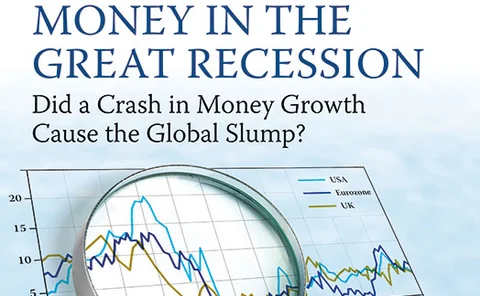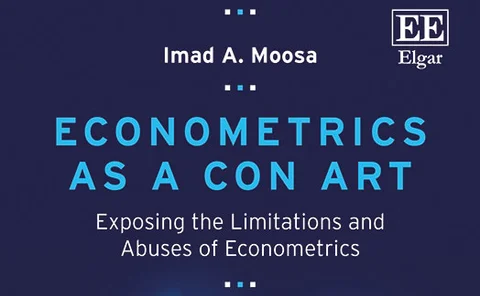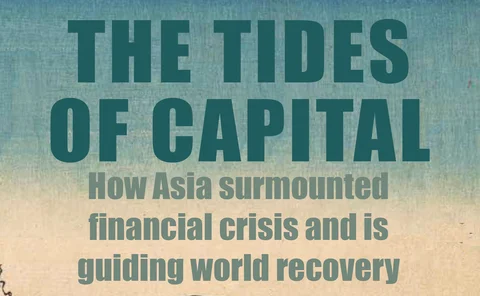Book reviews
Book notes: The End of Theory, by Richard Bookstaber
Bookstaber provides an entertaining introduction to agent-based modelling – a potential new front for economics
Book notes: Money in the Great Recession, by Tim Congdon
A stimulating collection of papers on the monetarist theory that had central bankers in late 2008 focused on boosting the quantity of broad money “the Great Recession would not have happened”
Book notes: The Right Balance for Banks, by William Cline
An interesting analysis of optimal capital requirements for G-Sibs, examining whether Basel III requirements will be enough to stem another financial crisis
Book notes: Hole in the Wall, by James Shepherd-Barron
Cash machines have changed the way cash is managed, but is there a future for such machines in a world looking to go cashless?
Book notes: Econometrics as a Con Art, by Imad Moosa
Every central bank should have a copy of this interesting study, which holds common econometric practice under the microscope, writes Graham Bannock
Book notes: Advice & Dissent: My Life in Public Service, by YV Reddy
An engaging look into the private life and career of a former governor of the Reserve Bank of India, and arguably one of the best central bankers of the twentieth century, YV Reddy
Book notes: The Myth of Independence, by Sarah Binder and Mark Spindel
Politicians would do well to heed the authors’ lessons, but their economic analysis could be stronger, writes Niels Bünemann
Book notes: The Limits of the Market, by Paul de Grauwe
De Grauwe has produced a concise analysis into how markets and governments react with one another; but his lack of familiarity with the history of economic thought is surprising
Book notes: The Spider Network, by David Enrich
A thrilling exploration of how currency trader Tom Hayes and confederates managed to corrupt the UK banking system in what has become one of the largest financial scandals in history
Book notes: The Tides of Capital, by Julia Leung
This “stimulating read” offers a unique perspective on how Asian countries have developed economically over the past 20 years. More interesting is Leung’s unintentional revelation that they still have a long way to go
Book notes: Can We Avoid Another Financial Crisis?, by Steve Keen
Steve Keen challenges “mainstream” economic thinking in this concise book, hoping to shift the political debate on debt
Book notes: Fed Up, by Danielle diMartino Booth
A “fascinating but annoying” account by a US Federal Reserve insider who openly criticises the culture of the US central bank and policy decisions made by the institution leading up to and following the financial crisis
Book notes: Crash Bang Wallop, by Iain Martin
A comprehensive study of the City of London and how it became the world’s leading financial centre prior to the financial crisis and the UK’s vote to leave the European Union
Book notes: Gaining Currency, by Eswar Prasad
A detailed study into the renminbi’s journey to becoming the reserve currency, taking a close look at the hurdles it has overcome and what obstacles remain in its way to competing on the global stage
Book notes: Bankers, Bureaucrats and Central Bank Politics, by Christopher Adolph
An interesting, if slightly dated, analysis of those who made monetary policy decisions in advanced economies between 1950–2001, attempting to understand whether personal background influences decision-making
Book notes: Architects of the Euro, edited by Kenneth Dyson and Ivo Maes
This biographical study of the 10 key players in the development of the Economic and Monetary Union provides a contrast to more historical analyses
Book notes: Competition and Stability in Banking, by Xavier Vives
Xavier Vives has written a fascinating book that highlights many important issues in banking regulation. But there are some flaws in his argument
Book notes: The Nobel Factor, by Avner Offer and Gabriel Söderberg
The authors offer some illuminating points on the politics behind the Nobel Prize in Economic Sciences, but fail to sufficiently challenge Sweden's social democracy, writes Graham Bannock
Book notes: The International Monetary Fund: Distinguishing Reality from Rhetoric, by Graham Bird and Dane Rowlands
The book brings valuable rigour to bear in assessing the work of the IMF, but suffers from a reliance on ageing data in many places, says Jacek Klich
Book notes: The Man Who Knew: The Life & Times of Alan Greenspan, by Sebastian Mallaby
An extensive account of Greenspan's life and achievements, but would have benefited from a closer analysis of his relationships with comrades at the Fed
Book notes: Shadow banking in China, by Andrew Sheng and Ng Chow Soon
The authors dispel many myths about shadow banking in China – but may underestimate future risks, writes Michael Taylor
Book notes: On central banking, by Jan Qvigstad
Qvigstad’s collection of lectures captures not just the culture of Norwegian central banking, but also an intellectual history of which the country can be proud
Book notes: The curse of cash, by Kenneth S Rogoff
A well-written book and sincerely argued, but it is based on weak economic analysis and inadequate economic and political history
Book notes: Achieving financial stability and growth in Africa, edited by Stephany Griffith-Jones and Ricardo Gottschalk
John Chown praises this comprehensive review that studies the possibility of achieving ‘the impossible’ in low-income Africa – both growth and financial stability























